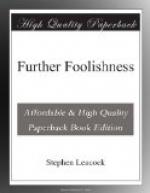The Field-Marshal, majestic as ever, gathered up the manifesto, clicked his heels together and withdrew.
As the door closed behind him, I had expected the little Sultan to fall into hopeless collapse.
Not at all. On the contrary, a look of peculiar cheerfulness spread over his features.
He refilled his narghileh and began quietly smoking at it.
“Toomuch,” he said, quite cheerfully, “I see there is no hope.”
“Alas!” said the secretary.
“I have now,” went on the Sultan, “apparently but sixty minutes in front of me. I had hoped that the intervention of the United States might have saved me. It has not. Instead of it, I meet my fate. Well, well, it is Kismet. I bow to it.”
He smoked away quite cheerfully.
Presently he paused.
“Toomuch,” he said, “kindly go and fetch me a sharp knife, double-edged if possible, but sharp, and a stout bowstring.”
Up to this time I had remained a mere spectator of what had happened. But now I feared that I was on the brink of witnessing an awful tragedy.
“Good heavens, Abdul,” I said, “what are you going to do?”
“Do? Why kill myself, of course,” the Sultan answered, pausing for a moment in an interval of his cheerful smoking. “What else should I do? What else is there to do? I shall first stab myself in the stomach and then throttle myself with the bowstring. In half an hour I shall be in paradise. Toomuch, summon hither from the inner harem Fatima and Falloola; they shall sit beside me and sing to me at the last hour, for I love them well, and later they too shall voyage with me to paradise. See to it that they are both thrown a little later into the Bosphorus, for my heart yearns towards the two of them,” and he added thoughtfully, “especially perhaps towards Fatima, but I have never quite made up my mind.”
The Sultan sat back with a little gurgle of contentment, the rose water bubbling soothingly in the bowl of his pipe.
Then he turned to his secretary again.
“Toomuch,” he said, “you will at the same time send a bowstring to Codfish Pasha, my Chief of War. It is our sign, you know,” he added in explanation to me—“it gives Codfish leave to kill himself. And, Toomuch, send a bowstring also to Beefhash Pasha, my Vizier—good fellow, he will expect it—and to Macpherson Effendi, my financial adviser. Let them all have bowstrings.”
“Stop, stop,” I pleaded. “I don’t understand.”
“Why surely,” said the little man, in evident astonishment, “it is plain enough. What would you do in Canada? When your ministers—as I think you call them—fail and no longer enjoy your support, do you not send them bowstrings?”
“Never,” I said. “They go out of office, but—”
“And they do not disembowel themselves on their retirement? Have they not that privilege?”
“Never!” I said. “What an idea!”




